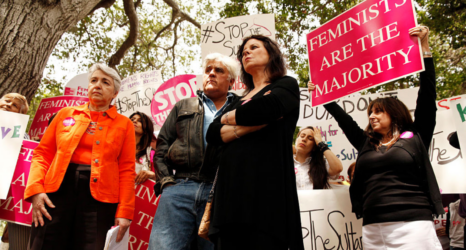In the Spring 2023 issue of Ms., contributing editor Carrie Baker examines how the legal reasoning used in Dobbs v. Jackson—which overturned Roe v. Wade—could erode women’s rights beyond abortion. The majority opinion in Dobbs argued that the “14th Amendment protects only rights explicitly mentioned in the Constitution, those intended to be protected by the framers of the 14th Amendment in 1868, or rights ‘deeply rooted in the Nation’s history and tradition.’” Using this approach, the Court overturned Roe—and as Baker explained, “If applied to the 14th Amendment equal protection clause itself, could overturn or erode constitutional sex equality law” for women altogether.
“A Court that doesn’t feel like abiding by 50 years of precedent, doesn’t need to respect precedents … against sex-based discrimination,” said Melissa Murray, a New York University law professor. “That is ominous.”

In the face of these threats, experts point to the Equal Rights Amendment (ERA) as a potential avenue to fight back.
“How do we, as women, as feminists, actually make a shift that will stand the test of time when it comes to women’s rights?” asked constitutional law scholar and Boston University professor Aziza Ahmed. “This period that we’re living through has shown us it’s very difficult to accomplish that. The Court was willing to go so far as to overturn Roe. I think this speaks to the importance of an Equal Rights Amendment. We have to make it harder for conservative judges and politicians to say that [women’s rights aren’t] the will of the American people.”
Join the Ms. community today and you’ll get the Spring issue delivered straight to your mailbox!
Here’s a glimpse at what else you’ll find within the pages of the upcoming Spring issue:
- Inside the state-by-state battle for abortion rights. After six state-level wins in the 2022 midterms, reproductive-rights advocates see a path to victory: letting the voters decide. “So many people have felt despair in reaction to the fall of Roe and feel like there are so few things we can do to protect our own rights and the rights of people we love around the country,” Kelly Hall, executive director of the Fairness Project, told Ms. “Ballot measures offer a really important work-around when our elected leaders are acting so far outside of our strong policy opinions as citizens.”
- An investigation into the adoption option. During oral arguments in Dobbs, Justice Amy Coney Barrett contended that abortion is no longer needed because “safe-haven laws take care of that problem.” And Justice Samuel Alito wrote in a footnote that “a woman who puts her newborn up for adoption today has little reason to fear that the baby will not find a suitable home.” Ms.’s reporter fact-checked Coney Barrett’s and Alito’s suggestions, which one interviewee called “horrific,” brutal” and “cruel.”
- A report from the front lines in Ukraine’s Donetsk and Kharkiv Oblasts. Ms. contributor Katie Livingstone introduces readers to a few tough mothers who have rejected the narrative that casts women with children as victims of war. They are part of the growing number of Ukrainian women who are fighting to bring about the war’s end. “If I go home, the war won’t stop, and [my son’s] not safe,” explained one of the mothers, now a sergeant in the Ukrainian Armed Forces.
When you become a member of Ms., you get the magazine in print or on our app, or both and you’re the first to get information alerts and event invitations from our team. When you become a member, you’re supporting independent, feminist media—and becoming part of a global community of feminists who care about the issues that matter to you.
Join today to get our newest issue delivered straight to your mailbox—and fuel another year of our reporting, rebelling and truth-telling.
Learn more about what rights are at stake—and how feminists are already fighting back—in the Spring issue of Ms., online and on newsstands now.
Up next:
U.S. democracy is at a dangerous inflection point—from the demise of abortion rights, to a lack of pay equity and parental leave, to skyrocketing maternal mortality, and attacks on trans health. Left unchecked, these crises will lead to wider gaps in political participation and representation. For 50 years, Ms. has been forging feminist journalism—reporting, rebelling and truth-telling from the front-lines, championing the Equal Rights Amendment, and centering the stories of those most impacted. With all that’s at stake for equality, we are redoubling our commitment for the next 50 years. In turn, we need your help, Support Ms. today with a donation—any amount that is meaningful to you. For as little as $5 each month, you’ll receive the print magazine along with our e-newsletters, action alerts, and invitations to Ms. Studios events and podcasts. We are grateful for your loyalty and ferocity.





